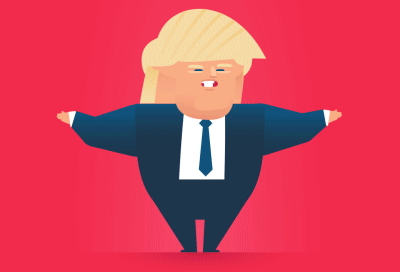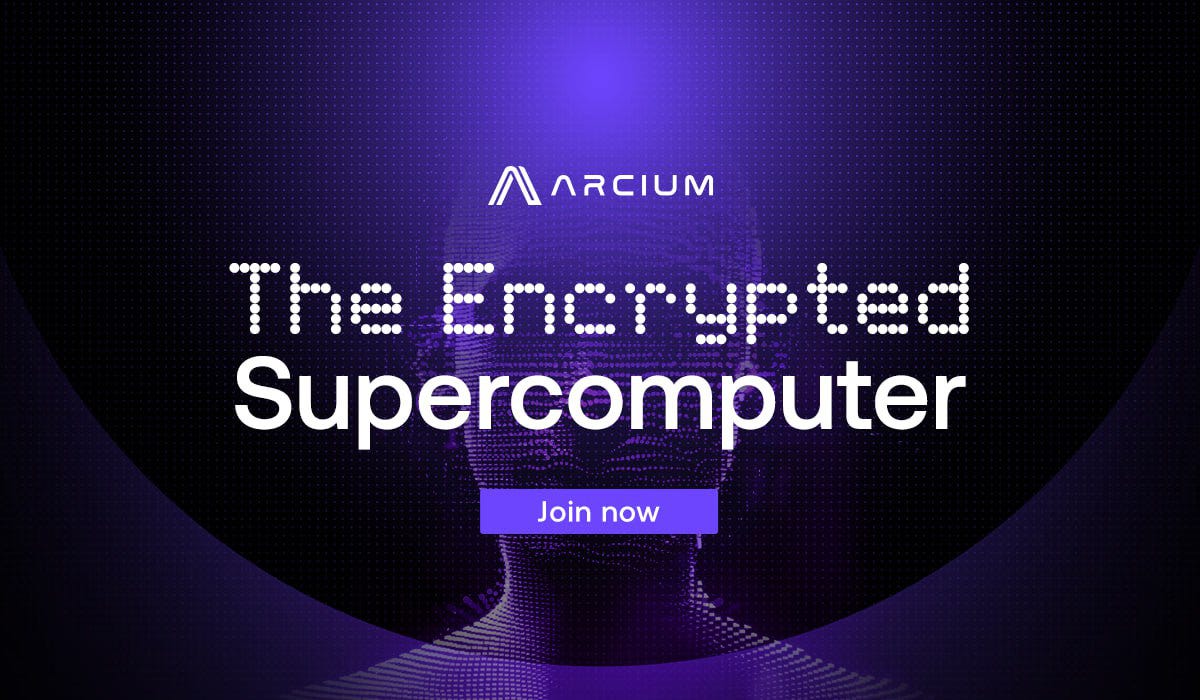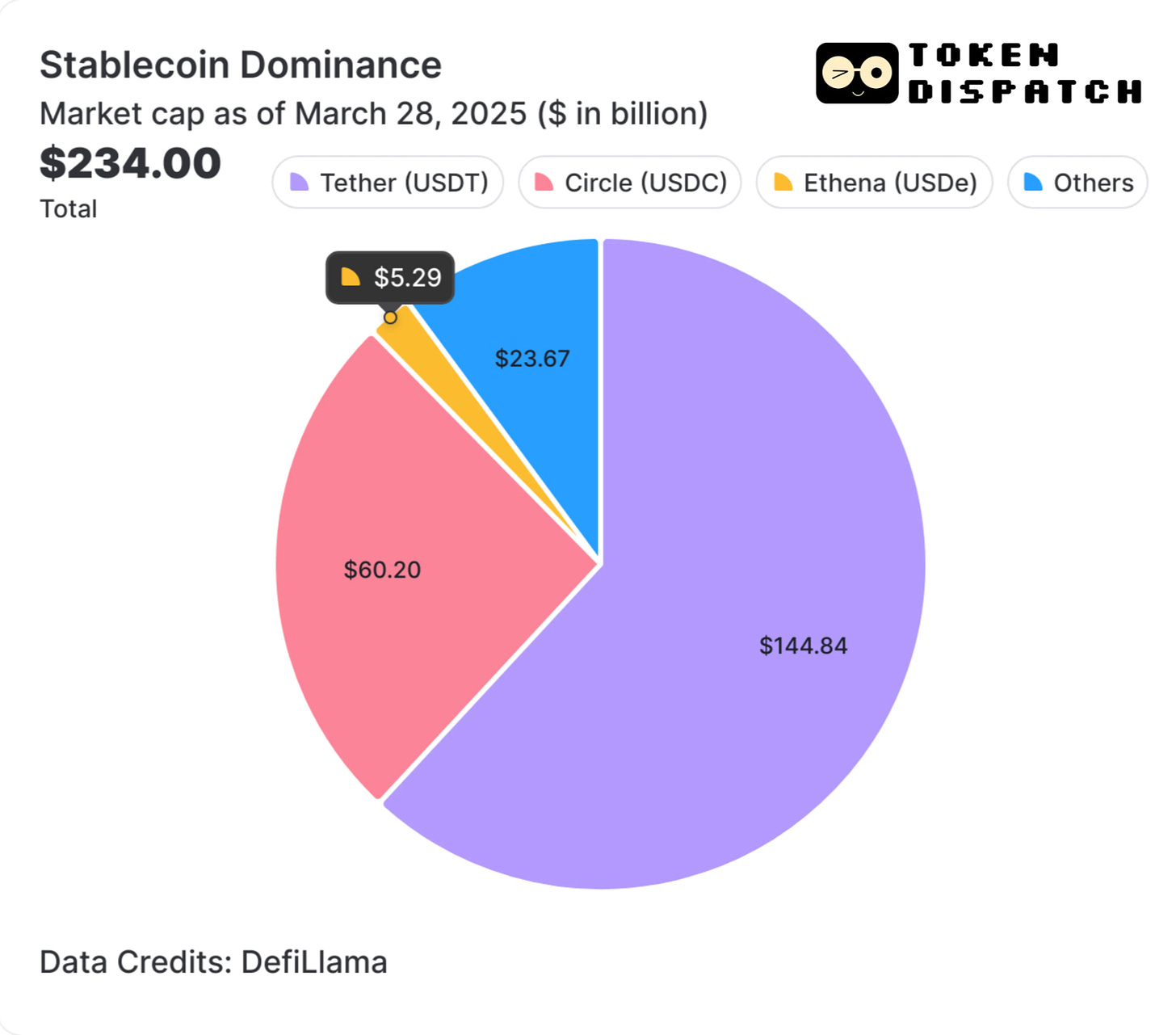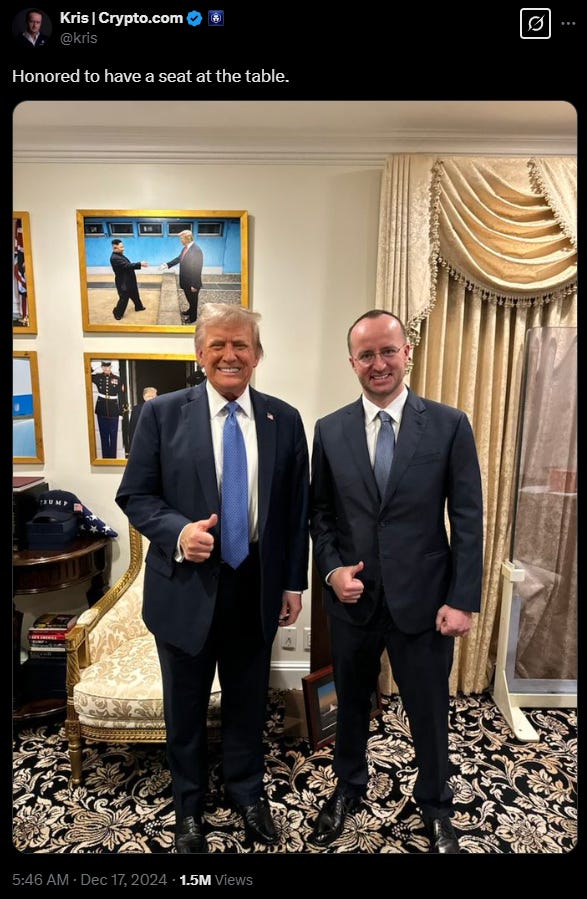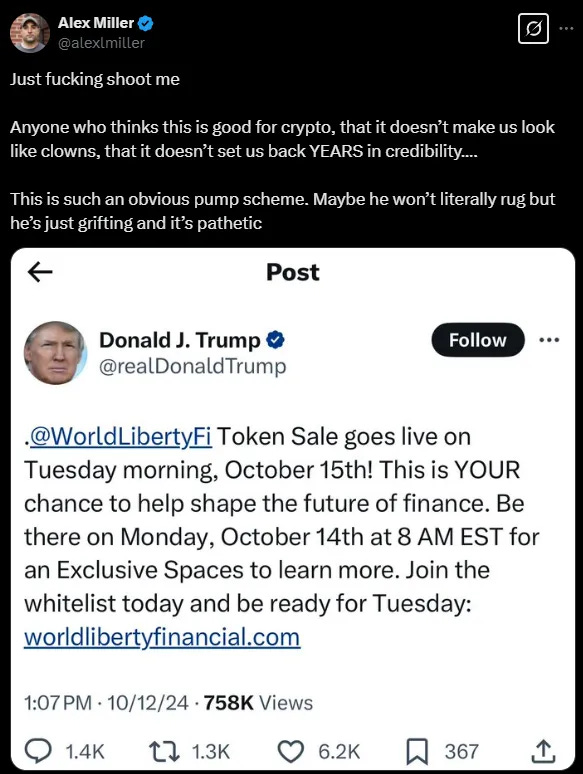Hello, y'all. Happy Saturday.
A crypto venture backed by the sitting president of the largest economy in the world announced this week its plan to launch a stablecoin designed for cross-border transactions and backed by US treasury bills.
And the world’s not even surprised. Why? This is just another addition to a rapidly expanding portfolio of crypto ventures connected to US president Donald Trump.
In two months since inauguration, the Trump family has built a crypto empire spanning stablecoins, investment firms, memecoins, and ETFs — all while the administration actively rewrites the regulatory framework governing these same assets.
That’s a precedent no sitting president ever set before today.
In today's Wormhole, we explore how Trump's growing crypto business interests are reshaping industry dynamics and raising unprecedented conflict of interest questions.
"Dude, Arcium is actually wild."
You know how companies always need access to your data to "improve services"? Yeah, that’s just a fancy way of saying they collect, sell, and sometimes leak your info. Arcium flips that on its head.
It lets businesses use data without ever seeing it. Like, AI can train on encrypted data, banks can process transactions without exposing user info, and companies can collaborate on sensitive data without actually sharing it.
Basically, it’s privacy that actually works. No gimmicks, no "just trust us" nonsense.
What can this actually do?
- AI models that don’t need to see your data to learn from it
- Banks that detect fraud without snooping on your transactions
- Companies that analyze trends without selling your personal info
- Cloud computing that doesn’t need you to "trust the provider"
This isn’t some quiet tech upgrade. This changes the game. Check it out!
Trump and Co’s Crypto Footprint
On Tuesday, the World Liberty Financial (WLF) project — co-founded by Trump's sons alongside real estate magnate Steve Witkoff — unveiled its USD1 stablecoin on Tuesday. The company announced the token will be backed by short-term US government treasuries, US dollar deposits, and other cash equivalents and custodied by BitGo.
Why stablecoins?
This move positions the Trump family into the $230+ billion stablecoin market that’s currently dominated by Tether (61%) and Circle (25%).
Stablecoins are the critical infrastructure of crypto markets and serve as essential on/off ramps between traditional finance and digital assets.
WLF’s emphasis on US-pegged assets could strengthen its appeal in cross-border settlements in a Trump 2.0 administration that’s stormed back to the White House on the back of Make America Great Again (MAGA) nativist political slogan.
Get 17% discount on our annual plans and access our weekly premium features (HashedIn, Wormhole, Rabbit hole and Mempool) and subscribers only posts. Also, show us some love on Twitter and Telegram.
What’s in it for Trump?
This announcement came just a week after WLF aggregated over $550 million through sales of its WLFI token. Per the project's documentation, Trump and his family receive a 75% share of revenue generated beyond the initial $30 million raised. Anything raised after that goes to three separate entities.
The first, DT Marks DEFI LLC, is owned and controlled by President Trump and members of his family, including Eric, Donald Jr, and Barron. The second firm is owned by Chase Herro and Zak Folkman, World Liberty Financial’s co-founders. The third entity is a vehicle for Trump ally Steven Witkoff, a real estate investor and developer, and his sons Zach and Alex, who are also co-founders of World Liberty Financial.
Beyond stablecoins, Trump-linked firms are also betting on institutional investment space.
Trump Media and Technology Group (TMTG), which runs the Truth Social social-media platform and is majority-owned by US President Donald Trump, in January this year launched Truth.Fi, a financial services arm that will invest up to $250 million in crypto assets.
This puts the Trump enterprise in the rapidly growing crypto wealth management sector, which attracted tens of billions in institutional inflows into exchange-traded products during 2024 alone.
The venture has established partnerships with Charles Schwab for custody and Yorkville Advisors as investment manager. TMTG also filed trademarks for digital wallet services, signalling broader fintech ambitions.
Just last week, TMTG signed a non-binding agreement with Crypto.com to launch several exchange-traded funds (ETFs), including a "Bitcoin Plus ETF" that would hold BTC, ETH, Solana, XRP, and Cronos (CRO). This strategic move targets the crypto ETF market, which has attracted over $35 billion in spot Bitcoin ETFs since they debuted in January 2024.
Existing crypto ETFs charge management fees between 0.12% and 1.5%, representing a lucrative revenue stream for issuers. This partnership followed Trump's December meeting with Crypto.com CEO Kris Marszalek.
That’s not all.
Three TMTG executives — including CEO Devin Nunes — formed Renatus Tactical Acquisition Corp I, a Special Purpose Acquisition Company (SPAC) or a ‘blank cheque’ company seeking to raise $179 million specifically to acquire US-based crypto companies.
This structure provides Trump allies with a mechanism to rapidly consolidate crypto infrastructure as regulatory barriers fall.
Read: Trump Media Launches $179M SPAC, Targets Crypto and Defence Deals
The Regulatory Paradox
As Trump's business interests in crypto expand, his administration has dramatically shifted the regulatory landscape in ways that directly benefit these ventures.
The president's re-election sent BTC prices surging to a $109,000-level, although the cryptocurrency is crawling back to reclaim the $100,000 mark. His appointment of crypto-friendly officials to the SEC — including the creation of a crypto task force under Commissioner Hester Peirce — has already resulted in reduced enforcement actions.
Read: Case Closed: SEC’s Crypto Cleanup🧹
The administration is also actively supporting the "Financial Innovation and Technology for the 21st Century Act" (FIT21), which would create a regulatory framework favourable to stablecoins like WLF's new USD1.
All these possibilities have triggered concerns within the industry for possible conflict of interest.
"I think it's plainly wrong for a President of the United States to engage in commercial ventures or have his family and associates engage in commercial ventures that can be directly influenced by the policies he adopts as President," Former Commodity Futures Trading Commission (CFTC) Chair Timothy Massad told BeInCrypto.
This creates a stark contrast with previous administrations. While past presidents like Jimmy Carter and George W. Bush placed assets in blind trusts to avoid conflicts, Trump has expanded his business interests in areas directly affected by his policy decisions.
Massad, who chaired the CFTC under President Barack Obama, wasn’t the only one who called out the conflicting interest.
Alex Miller, CEO of Web3 platform Hiro, bluntly described WLF as an "obvious pump scheme."
Last month, Anthony Scaramucci - a former White House Communications Director under Donald Trump and the founder of SkyBridge Capital - called out the conflict of interest during his interview on Peston, a current affairs news show.
“You guys are arguing over Taylor Swift tickets over here… this guy took $500m out of the market 48 hours before he was sworn in!”
Legal concerns have mounted as well.
Public Citizen filed a complaint with the Department of Justice arguing that Trump's crypto ventures violate federal laws barring officials from soliciting gifts.
Senator Elizabeth Warren called for an ethics probe into Trump's crypto activities, describing them as his "latest grift to enrich himself."
The debate extends to constitutional experts who warn the USD1 stablecoin could violate the emoluments clause by providing a channel for foreign influence.
Cyber attorney Andrew Rossow told Cointelegraph it represents "a direct affront to constitutional safeguards meant to prevent conflicts of interest."
“With Trump and his family controlling 60% of World Liberty’s equity interests, the USD1 stablecoin could facilitate indirect financial gains or undue foreign influence over US policy, particularly if foreign entities invest in or use the stablecoin.”
The Global Dimension
Zach Witkoff, WLF co-founder, specifically highlighted that USD1 would enable "sovereign investors and major institutions" to conduct "seamless, secure cross-border transactions."
This emphasis on foreign users has alarmed former regulators.
Corey Frayer, who worked on crypto policy at the SEC under the Biden administration, warned that "foreign entities might use USD1 to gain favour with the administration," adding there's "a lot of opacity around this marketplace, and prior relationships with illicit finance."
The Trump-backed stablecoin could effectively create a backdoor channel for foreign influence that circumvents traditional oversight mechanisms.
How does all this impact the performance of Trump and Co’s crypto ventures?
It’s been mixed but volatile.
Nobody’s forgotten the Trump memecoin - did we? Skyrocketed to almost a $15 billion market cap before plummeting 85% from its peak. MELANIA suffered an even steeper decline, dropping 87% from its high.
WLF's WLFI token has maintained more stability, though the project remains pre-launch with no actual products available to users.
Collectively, the WLF’s stablecoin launch, TMTG’s collaborations in ETF space and the launch of an investment vehicle to target crypto and defence-related deals places Trump-linked entities in a position to capitalise on the administration's policy shift.
Token Dispatch View 🔍
The unprecedented convergence of presidential power and crypto entrepreneurship poses fundamental questions for both the industry and American governance.
On one hand, having a pro-crypto president actively participating in the ecosystem brings powerful legitimacy and mainstream attention. Trump's ventures could accelerate adoption and create new pathways for innovation in financial services.
On the other hand, the direct financial benefits flowing to a sitting president from an industry he regulates creates conflicts that would be unacceptable in most governance contexts. When policy decisions directly impact personal wealth, objectivity becomes impossible to maintain.
Despite these concerns, a significant portion of the industry is actively seeking association with Trump-linked ventures. As Movement Labs founder Rushi Manche says, "Politics is the most important [go-to] market play for crypto companies today."
Projects like Movement Labs have seen their token prices surge after being included in World Liberty Financial's portfolio, with founders immediately leveraging these connections through strategic social media posts and press releases.
This dynamic has created a new business model: blockchain founders clamouring for Trump's investment attention, with reports claiming some projects willing to purchase WLFI tokens in exchange for reciprocal investments from Trump's venture. The WLF, however, refuted the allegations.
Meanwhile, the Trump family's influence continues expanding beyond direct investments. Eric Trump recently joined Japanese Bitcoin treasury company Metaplanet's board of directors, while Donald Trump Jr. was appointed as strategic advisor to prediction market platform Kalshi. These appointments further consolidate the family's influence across various segments of the digital asset industry.
The crypto world now faces a crucial decision point: balancing the benefits of favourable regulation against the risks of undermining the principles of decentralisation and fair markets that form the foundation of blockchain's promise.
The industry must decide whether regulatory favouritism and presidential association are worth the potential long-term cost to its credibility and independence.
Token Dispatch is a daily crypto newsletter handpicked and crafted with love by human bots. You can find all about us here 🙌
If you want to reach out to 200,000+ subscriber community of the Token Dispatch, you can explore the partnership opportunities with us.
📩 Fill out this form to submit your details and book a meeting with us directly.
Disclaimer: This newsletter contains sponsored content and affiliate links. All sponsored content is clearly marked. Opinions expressed by sponsors or in sponsored content are their own and do not necessarily reflect the views of this newsletter or its authors. We may receive compensation from featured products/services. Content is for informational purposes only, not financial advice. Trading crypto involves substantial risk - your capital is at risk. Do your own research.


